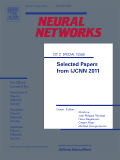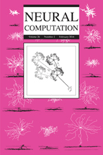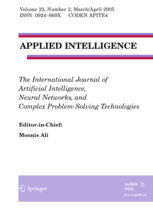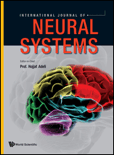
NEURAL NETWORKS
metrics 2024
Illuminating Pathways in Neural Science and AI
Introduction
NEURAL NETWORKS, an esteemed journal with the ISSN 0893-6080 and E-ISSN 1879-2782, is published by Pergamon-Elsevier Science Ltd in the United Kingdom. This influential journal, established in 1988 and continuing its publication through 2024, is recognized for its significant contributions to the fields of Artificial Intelligence and Cognitive Neuroscience, ranking in the Q1 category in both disciplines as of 2023. With a strong Scopus rank of #4/115 in Cognitive Neuroscience and #35/350 in Artificial Intelligence, and a commendable percentile of 96th and 90th respectively, NEURAL NETWORKS stands at the forefront of academic research. Researchers, professionals, and students can benefit from the journal's rigorous peer-review process and the dissemination of groundbreaking findings that shape understanding in artificial intelligence methodologies and their cognitive applications. While the journal currently operates under traditional access options, it serves as a vital resource in fostering innovations and cross-disciplinary collaboration.
Metrics 2024
 2.60
2.60 6.00
6.00 7.90
7.90 173
173Metrics History
Rank 2024
Scopus
IF (Web Of Science)
JCI (Web Of Science)
Quartile History
Similar Journals

NEURAL COMPUTATION
Transforming theoretical frameworks into practical applications.NEURAL COMPUTATION, published by MIT PRESS, is a leading academic journal that focuses on the interdisciplinary field of neural computing, combining insights from artificial intelligence, cognitive neuroscience, and computational modeling. With an impressive impact factor and consistently high rankings—being positioned in the Q1 category of Arts and Humanities and Q2 in Cognitive Neuroscience—this journal serves as a vital resource for researchers and professionals interested in understanding the complex interactions between neural processes and computational systems. Founded in 1995 and continuing through its converged years until 2024, NEURAL COMPUTATION publishes cutting-edge articles that advance theoretical knowledge and practical applications in both fields. While it does not provide open access, the journal ensures rigorous peer-review processes, making it an essential platform for disseminating significant research findings. With its commitment to fostering innovation and understanding at the intersection of neuroscience and computation, NEURAL COMPUTATION stands out as a cornerstone for academic exploration and discovery.

International Journal of Fuzzy Logic and Intelligent Systems
Unveiling the Future of Fuzzy Logic ApplicationsInternational Journal of Fuzzy Logic and Intelligent Systems, ISSN: 1598-2645, is a prestigious journal published by the Korean Institute of Intelligent Systems, dedicated to advancing the fields of Artificial Intelligence, Computational Theory and Mathematics, Computer Science Applications, Logic, and Signal Processing. Established to foster interdisciplinary research, this journal has quickly established its reputation, reaching a respectable Q3 quartile ranking across multiple categories in 2023. It serves as a vital resource for researchers, professionals, and students, offering insights into cutting-edge methodologies and innovative applications of fuzzy logic and intelligent systems. With a focus on disseminating high-quality research, the journal attracts contributions that drive the evolution of intelligent technologies and their practical implications. Published from South Korea, the journal is positioned to impact the global community, facilitating a deeper understanding of intelligent systems in various domains.

NEURAL COMPUTING & APPLICATIONS
Illuminating the Future of AI and Software DevelopmentNEURAL COMPUTING & APPLICATIONS is a premier journal dedicated to the burgeoning fields of Artificial Intelligence and Software Engineering, published by Springer London Ltd. Established in 1993, the journal serves as a pivotal platform for disseminating cutting-edge research and innovative applications in neural computing, covering a broad range of topics from algorithm development to real-world applications. With its impressive categorization in the 2023 Journal Quartiles—ranging Q2 in Artificial Intelligence and Q1 in Software—it stands out in its discipline, ranking 42nd out of 407 in Computer Science Software and 50th out of 350 in Computer Science Artificial Intelligence, reflecting its significant impact in the academic community. Although not an open access journal, it provides vital access to significant findings and methodologies that drive advancements in technology. Researchers, professionals, and students looking to stay abreast of the most relevant and impactful developments in these fields will find NEURAL COMPUTING & APPLICATIONS an indispensable resource.

AI, published by MDPI, is a distinguished open access journal dedicated to advancing the field of artificial intelligence. Since its inception in 2020, the journal has swiftly established itself as a prominent platform for scholarly research, currently ranking in the Q2 category for 2023 within the artificial intelligence sector according to Scopus. With an impressive global reach from its base in Basel, Switzerland, the journal aims to foster innovation and collaboration among researchers, professionals, and students alike, providing a forum to share groundbreaking findings and applications in AI. The journal's commitment to accessibility ensures that research is available to a wide audience, enhancing knowledge dissemination and contributing significantly to the ongoing evolution of artificial intelligence technologies. To explore the latest in AI research, readers can access articles through their open access model, encouraging an inclusive academic environment.

APPLIED INTELLIGENCE
Empowering the future with cutting-edge AI advancements.Applied Intelligence is a prominent peer-reviewed journal that has been instrumental in advancing the field of Artificial Intelligence since its inception in 1991. Published by Springer, a reputable name in academic publishing, the journal focuses on the innovative applications of intelligent systems, algorithms, and methodologies across various disciplines. With an impressive Q2 ranking in the Artificial Intelligence category for 2023, and a Scopus rank of #117 out of 350 in its field, Applied Intelligence is recognized for its significant contributions and rigorous standards. The journal is accessed primarily through subscription, ensuring that high-quality research reaches the academic community and industry professionals alike. Its commitment to disseminating cutting-edge research makes it an invaluable resource for researchers, practitioners, and students interested in the practical implications of AI advancements. Join a community dedicated to exploring the transformative power of artificial intelligence and stay ahead in this ever-evolving field!

NEURAL PROCESSING LETTERS
Bridging Technology and Brain Science.NEURAL PROCESSING LETTERS, published by Springer, is a prestigious journal dedicated to the interdisciplinary fields of Artificial Intelligence, Computer Networks and Communications, Software Engineering, and Neuroscience. Established in 1994, the journal has built a solid reputation over the past decades, showcasing innovative research and developments that significantly contribute to the advancement of these dynamic areas. With a 2023 Scopus quartile ranking of Q2 in Artificial Intelligence and Computer Networks and Communications, and a Q3 ranking in Neuroscience, this journal occupies an important niche for professionals and researchers alike. The journal’s impact is further evidenced by its competitive Scopus ranks, positioning it within the top 60th percentile across its categories. Researchers looking for a platform to disseminate their findings in the intersection of technology and neuroscience will find NEURAL PROCESSING LETTERS an invaluable resource. For additional engagement and visibility, the journal supports various access options; however, it's important to note that it does not currently operate under an open access model. For submissions or queries, the journal can be reached at its headquarters in Dordrecht, Netherlands.

Neural Network World
Connecting Minds: Where Technology Meets NeuroscienceNeural Network World, published by the Academy of Sciences of the Czech Republic, Institute of Computer Science, is a preeminent journal dedicated to the fields of artificial intelligence, hardware and architecture, software engineering, and neuroscience. Since its inception in 1994, this journal has provided a platform for the dissemination of pioneering research and technical advancements in neural networks and their applications. Operating from the heart of Prague, this publication holds a Q4 quartile ranking across key categories, highlighting the growing interest and relevance in its multidisciplinary focus. Although it does not currently offer open access, its commitment to scholarly rigor ensures that readers engage with high-quality content, making it a valuable resource for researchers, professionals, and students alike. As the field evolves, Neural Network World serves as an essential forum for innovative ideas and critical discussions, reinforcing its significance in driving forward the future of technology and neuroscience.

Intelligenza Artificiale
Unveiling the Future of Intelligent SystemsIntelligenza Artificiale is a prominent academic journal dedicated to advancing the field of artificial intelligence, published by IOS PRESS, a renowned publisher in the scientific community. Based in the Netherlands, this journal's ISSN is 1724-8035 and its E-ISSN is 2211-0097. With a current impact factor that reflects its relevance in the scholarly landscape, it operates in the Q2 quartile of the Artificial Intelligence category as of 2023, which ranks it notably at #200 out of 350 within its field according to Scopus data. The journal provides a valuable platform for researchers, professionals, and students to disseminate and access cutting-edge findings from 2018 to 2024, focusing on the innovative applications and theoretical developments in artificial intelligence. With its commitment to fostering academic dialogue and collaboration, Intelligenza Artificiale is essential for anyone looking to stay at the forefront of AI research and practice.

Foundations and Trends in Machine Learning
Transforming Research into Actionable Knowledge in AIFoundations and Trends in Machine Learning is a premier academic journal published by NOW PUBLISHERS INC, specializing in the cutting-edge fields of artificial intelligence, human-computer interaction, and software engineering. Since its inception in 2008, this journal has established a formidable reputation, attaining a Q1 ranking in 2023 across all three categories in the Scopus index, confirming its place among the elite publications in these disciplines. With an exceptional impact reflected in its standing as the top-ranked journal in Computer Science for both Software and Artificial Intelligence, researchers and practitioners alike turn to this resource for in-depth reviews and foundational insights that drive progress in the rapidly evolving landscape of machine learning. While currently operating under traditional access options, the journal invites a diverse audience, including students, researchers, and industry professionals, to deepen their understanding and contribute to knowledge in this dynamic area of study.

International Journal of Neural Systems
Exploring the Frontiers of Neural Systems ResearchThe International Journal of Neural Systems, published by World Scientific Publishing Co Pte Ltd, is a prestigious peer-reviewed journal dedicated to the dynamic field of neural systems research. With an ISSN of 0129-0657 and an E-ISSN of 1793-6462, this journal serves as a vital resource for researchers, professionals, and students interested in the intersections of computer science, neural networks, and communications. Noteworthy for its impact, the journal has achieved impressive rankings in 2023, positioned in the Q1 quartile for both Computer Networks and Communications as well as in the miscellaneous category of Medicine, highlighting its interdisciplinary significance and broad relevance. The journal's Scopus rank places it at #33 out of 395 in its category, reflecting its influence and reach within the academic community. While the journal is not open access, its contributions to advancing the understanding of neural systems are invaluable, offering a platform for disseminating cutting-edge research and fostering collaboration among scholars. Since its inception, the International Journal of Neural Systems remains committed to excellence and innovation in its published content, making it an essential subscription for everyone involved in this exciting and rapidly evolving field.